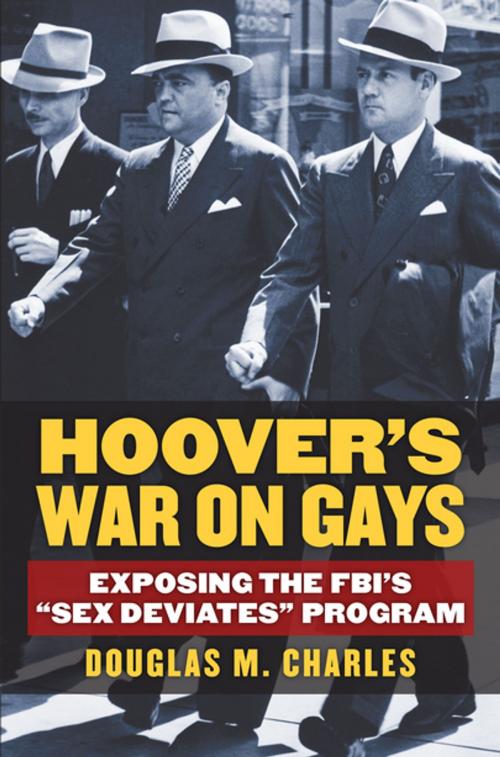Hoover's War on Gays
Exposing the FBI's "Sex Deviates" Program
Nonfiction, Social & Cultural Studies, Social Science, Crimes & Criminals, Criminology, History, Americas, United States, 20th Century| Author: | Douglas M. Charles | ISBN: | 9780700621507 |
| Publisher: | University Press of Kansas | Publication: | September 11, 2015 |
| Imprint: | University Press of Kansas | Language: | English |
| Author: | Douglas M. Charles |
| ISBN: | 9780700621507 |
| Publisher: | University Press of Kansas |
| Publication: | September 11, 2015 |
| Imprint: | University Press of Kansas |
| Language: | English |
At the FBI, the “Sex Deviates” program covered a lot of ground, literally; at its peak, J. Edgar Hoover's notorious “Sex Deviates” file encompassed nearly 99 cubic feet or more than 330,000 pages of information. In 1977–1978 these files were destroyed—and it would seem that four decades of the FBI's dirty secrets went up in smoke. But in a remarkable feat of investigative research, synthesis, and scholarly detective work, Douglas M. Charles manages to fill in the yawning blanks in the bureau's history of systematic (some would say obsessive) interest in the lives of gay and lesbian Americans in the twentieth century. His book, Hoover’s War on Gays, is the first to fully expose the extraordinary invasion of US citizens' privacy perpetrated on a historic scale by an institution tasked with protecting American life.
For much of the twentieth century, when exposure might mean nothing short of ruin, gay American men and women had much to fear from law enforcement of every kind—but none so much as the FBI, with its inexhaustible federal resources, connections, and its carefully crafted reputation for ethical, by-the-book operations. What Hoover’s War on Gays reveals, rather, is the FBI’s distinctly unethical, off-the-books long-term targeting of gay men and women and their organizations under cover of "official" rationale—such as suspicion of criminal activity or vulnerability to blackmail and influence. The book offers a wide-scale view of this policy and practice, from a notorious child kidnapping and murder of the 1930s (ostensibly by a sexual predator with homosexual tendencies), educating the public about the threat of "deviates," through WWII's security concerns about homosexuals who might be compromised by the enemy, to the Cold War's "Lavender Scare" when any and all gays working for the US government shared the fate of suspected Communist sympathizers. Charles's work also details paradoxical ways in which these incursions conjured counterefforts—like the Mattachine Society; ONE, Inc.; and the Daughters of Bilitis—aimed at protecting and serving the interests of postwar gay culture.
With its painstaking recovery of a dark chapter in American history and its new insights into seemingly familiar episodes of that story—involving noted journalists, politicians, and celebrities—this thorough and deeply engaging book reveals the perils of authority run amok and stands as a reminder of damage done in the name of decency.
At the FBI, the “Sex Deviates” program covered a lot of ground, literally; at its peak, J. Edgar Hoover's notorious “Sex Deviates” file encompassed nearly 99 cubic feet or more than 330,000 pages of information. In 1977–1978 these files were destroyed—and it would seem that four decades of the FBI's dirty secrets went up in smoke. But in a remarkable feat of investigative research, synthesis, and scholarly detective work, Douglas M. Charles manages to fill in the yawning blanks in the bureau's history of systematic (some would say obsessive) interest in the lives of gay and lesbian Americans in the twentieth century. His book, Hoover’s War on Gays, is the first to fully expose the extraordinary invasion of US citizens' privacy perpetrated on a historic scale by an institution tasked with protecting American life.
For much of the twentieth century, when exposure might mean nothing short of ruin, gay American men and women had much to fear from law enforcement of every kind—but none so much as the FBI, with its inexhaustible federal resources, connections, and its carefully crafted reputation for ethical, by-the-book operations. What Hoover’s War on Gays reveals, rather, is the FBI’s distinctly unethical, off-the-books long-term targeting of gay men and women and their organizations under cover of "official" rationale—such as suspicion of criminal activity or vulnerability to blackmail and influence. The book offers a wide-scale view of this policy and practice, from a notorious child kidnapping and murder of the 1930s (ostensibly by a sexual predator with homosexual tendencies), educating the public about the threat of "deviates," through WWII's security concerns about homosexuals who might be compromised by the enemy, to the Cold War's "Lavender Scare" when any and all gays working for the US government shared the fate of suspected Communist sympathizers. Charles's work also details paradoxical ways in which these incursions conjured counterefforts—like the Mattachine Society; ONE, Inc.; and the Daughters of Bilitis—aimed at protecting and serving the interests of postwar gay culture.
With its painstaking recovery of a dark chapter in American history and its new insights into seemingly familiar episodes of that story—involving noted journalists, politicians, and celebrities—this thorough and deeply engaging book reveals the perils of authority run amok and stands as a reminder of damage done in the name of decency.















